Archive for the ‘52 Stories’ Category
52 Stories #28—Treasured Memories
 So many of us experience the same milestone events in our lives—our wedding day, the births of our children. What are some of my memories of these days?
So many of us experience the same milestone events in our lives—our wedding day, the births of our children. What are some of my memories of these days?
- My husband and I got married during the Christmas holidays while we were between college semesters at the University of Wyoming. We had our rehearsal dinner the night before the wedding in a crowded restaurant at the local airport, not the place I would have chosen. Our simple wedding took place at my home church on the following snowy evening. The church’s Christmas trees still stood on either side of the altar, and we made our vows beneath an archway decorated with pine boughs. My husband chose the processional and recessional, the two versions of “Joy” by Bach and Beethoven. A college friend provided vocal music, “The Wedding Song”. Our attendants wore dark green, and my husband wore a yellow jacket. His brother served as best man and my best friend served as maid of honor. My brother was an usher. I remember that he wanted to get the most out of his tuxedo rental, so he wore it again the next day when he went out cross-country skiing. We had our wedding reception at the local Holiday Inn where the best man and I had both worked a couple of summers. A reception at a hotel instead of the church allowed us to serve alcoholic punch, something my dad insisted upon after having to walk me down the aisle. After the reception, we stayed overnight at the same Holiday Inn. My new husband roused me way too early the next morning so as to make sure we arrived at the airport in time for our flight for a Hawaiian honeymoon. It was a good thing he did, because we got seats when the flight was overbooked!
- Our oldest son was born five years later. The baby was due on March 22, but I wanted him to arrive a day earlier on the first day of spring. He complied and came into the world on a beautiful morning. Not only that, but he arrived with the wished-for full head of hair. I had been afraid he would be bald like I was when I was born. His sex was a surprise to us in those days before they offered ultrasounds. I can remember not wanting to look away from his tiny face, memorizing every feature of this new person in my life.
- Our younger son came along five years after that. A young man in a hurry, he was ten days early. Again, we did not know ahead of time what sex he was. When he was born, we knew he was ours when the nurse blurted out, “Gee, what big feet this baby has!” This was after we had passed the time in Labor and Delivery watching an Olympic hockey game. Later we learned this was a big mistake. Our child had one goal in life, and that was to play hockey. Beginning just a few years later, we were hockey parents until he completed high school.
Joyful memories, all. Beethoven’s “Joy” as our wedding recessional set the tone for a happy life together.
52 Stories #27—Leaving Home
 At age eighteen, I left home, more or less, to attend college in a town a couple of hours away from where my family lived in Casper, Wyoming. The University of Wyoming is located in Laramie, and my arrival there was a homecoming of sorts for I was born in Laramie. My parents dropped me off one beautiful late summer day, and for the first time I was on my own. After that, I would return to my parents’ home only for vacations. I was eager to begin my new life.
At age eighteen, I left home, more or less, to attend college in a town a couple of hours away from where my family lived in Casper, Wyoming. The University of Wyoming is located in Laramie, and my arrival there was a homecoming of sorts for I was born in Laramie. My parents dropped me off one beautiful late summer day, and for the first time I was on my own. After that, I would return to my parents’ home only for vacations. I was eager to begin my new life.
My high school buddy, Karen, and I received a room assignment in the women’s dormitory, White Hall. At twelve stories, it was the tallest building in the state. We had a corner room on the sixth floor and promptly set about personalizing it. We had already purchased coordinated bedspreads in a very 70’s-looking orange and avocado green. The room had three dark brown brick walls, and we painted the fourth wall gold. We felt privileged to have a sink in our room, but we had to travel down the hall for the toilets and showers.
Late in the afternoon of our arrival, after setting up our room, Karen and I explored the campus that would be our home for the next four years. We located the library and our Arts and Sciences College where she planned to study chemistry and I, psychology. We ran into a couple of guys from our high school graduating class who were also finding their way about the place. The cafeteria would not open for another day, so we spent a little of our precious funds to get a meal at a restaurant across the street from the dormitory complex. Back in White Hall for the evening, we met our neighbors and began to get acquainted.
Being suddenly cut off from any meaningful communication with my family felt very strange at first. Although we had a telephone on the wall in our room, I had no money for long-distance calls home. My parents never called me. I could write and receive letters, but composing them took time that a busy college student does not have. Only my mother wrote to me regularly. The built-in delays of back-and-forth letter writing made any meaningful conversation impossible. I felt alienated from my family, and we never regained the closeness we once had.
Yet soon enough, it did not matter so much. I had always liked school, and I enjoyed my studies. On Saturdays, I joined new friends to attend football games in War Memorial Stadium where we cheered on the Cowboys. On a couple of weekends when the team was away, someone with a car took Karen and me into the mountains surrounding Laramie for picnics.
In those early days, another welcoming place was Laramie’s Lutheran Campus Center. I had the opportunity to stay there one night while I was still in high school, so the place was familiar to me. I began attending services on Wednesday evenings and Sunday mornings. The church was a constant in my life when so much else had changed. I met new people there, too, and attended the social events they hosted.
After a few weeks in Laramie I became accustomed to new routines and life on my own. I enjoyed my independence and the freedom it offered. The separation from my family began to feel okay. From then on, I concentrated on building my adult life. I had succeeded in leaving home.
52 Stories #26–Siblings
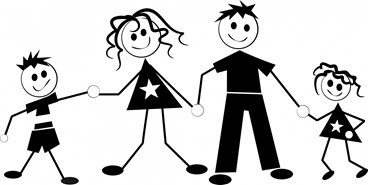 My parents had four children. I am the oldest, and I have two brothers and a sister. With a nine-year spread in our ages, I can remember clearly the births of my two youngest siblings, but I do not recall the day my first brother was born.
My parents had four children. I am the oldest, and I have two brothers and a sister. With a nine-year spread in our ages, I can remember clearly the births of my two youngest siblings, but I do not recall the day my first brother was born.
He arrived just 20 months after my own birth. To me, he has always been there. I am told we moved from a second-floor apartment to the main floor of a rental house to make room for him. Perhaps we shared a bedroom, but I do not remember this either. I recall the house as a noisy place with another family living in the basement. Understandably, my parents were eager to get us into a place solely occupied by the four of us. We did that about 6 months later when I was 2 ½. We rented a two-bedroom place known as The Dream House because it had once been a prize in a contest. For as long as we lived in that house, my brother and I shared a small bedroom. At first, he had a crib and I had a trundle bed. Later, we got bunk beds from the local Ethan Allen store.
We passed the crib along to our new baby brother when I was in kindergarten. From the beginning, the poor boy had more than his share of health problems. The day he came home from the hospital he was coated in a white salve to calm his eczema. That first year, he returned to the hospital a couple of times because severe allergies caused him to catch pneumonia easily. Life changed for all of us because of the elevated level of care he needed from the beginning and still needs today. We were glad to have my maternal grandmother there to help out for a while.
By the time I was nine, we lived in another state. A year later, a baby sister joined us. I stayed home from school that day to watch my brothers when my dad took my mom to the hospital for the birth. The process took longer than he anticipated. He came home at lunch time to make sure I had sent one brother to school and lunch ready. He also attempted to do a load of laundry, washing my brother’s red hoodie with our white underwear. Bad idea–everything turned pink. When the telephone range with the message that my sister was born, my dad returned to the hospital while I minded one brother and awaited the arrival of the other from school. Dad spent the afternoon viewing my new sister in the hospital nursery and visiting my mom. That evening he returned to make burned scrambled eggs for us for supper. That was the last straw. He gave up on housewifery and called in my grandmother. She arrived the next day. Finally, I could go back to school and he could escape to his office. My mom and sister came home from the hospital a few days later. The boys and I had only a brief glimpse of the baby before they put her in for a nap in the bassinet.
Her arrival completed our family. In many ways, we siblings became two groups of two. My oldest brother and I do not remember a time without each other, but we can recall our family life together from the earliest days. To our young minds, it seemed a long time before the other two children arrived on the scene. Everything changed when they did. No longer were we a family with two big and independent children. We became a family that needed to accommodate babies again.
The day each the siblings arrived marked a successive turning point in my family life. I acquired new companions and shouldered new responsibilities each time. Overall, I remember it being a hard adjustment, and I was not always as gracious as I should have been. Sibling rivalry was alive and well at my house.
52 Stories in 52 Weeks #25—Babyhood
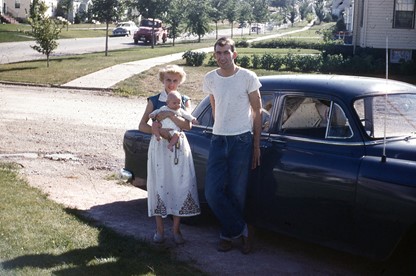 Obviously I do not recall the day I was born, but later my mom did tell me a bit about my infancy.
Obviously I do not recall the day I was born, but later my mom did tell me a bit about my infancy.
My parents lived in the college town of Laramie, Wyoming at the time I was born. I came into the world at the old Ivinson Memorial Hospital one spring night. I was my mom and dad’s first child.
I arrived a couple of weeks prematurely. Consequently, I was tiny and weighed less than the usual 5-pound threshold for life outside an incubator. Still, I had a lusty cry. The doctor decided I could skip the incubator and go home when my mother’s prescribed recovery time in the hospital ended.
The first time my mother looked at me, she thought I resembled my Finnish relatives. I had a bald head, and perhaps she suspected I would be blonde like them. She was right.
My dad was finishing up school as a business student at the University of Wyoming that year. He was graduated a month after I was born. He must have loved studying for his final exams with a wailing infant in the house. I had the privilege of attending his graduation ceremony, but I wasted it by crying the entire time. My mother had to take me out of the auditorium, so she missed it, too.
After the graduation, my dad needed to attend a three-month orientation in Casper, Wyoming for his new job as a petroleum landman. In the fall, he would be assigned to a permanent location in a field office. Not wanting to live in temporary digs in Casper, my mom took me to stay with her parents in Rapid City, South Dakota for the summer. There, my grandparents and aunt doted on me, the first grandchild.
In early July, my dad drove over from Casper for a visit. While he was there, I was baptized at the Trinity Lutheran church on the Fourth of July. My mother’s younger sister and my dad’s older brother served as my godparents.
When autumn arrived, Dad collected us, and we three moved north to Bismarck, North Dakota to begin his job. It fell to my mom to find us a place to live.
She thought the perfect location was an upstairs apartment for rent across the street from my dad’s office and the grocery store. Only problem was that the landlady wanted no children around. Mom went to talk to her and claimed that I was a very nice baby. She promised to keep me quiet.
The landlady relented. Mom, Dad, and I moved in. We stayed in that apartment until our family outgrew it when my brother was born a little over a year later. My mom said the landlady eventually grew to like me and was sorry to see us leave.
52 Stories #24–Family Sayings
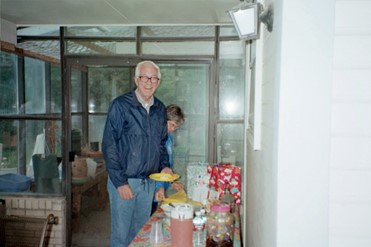 The men in our families often give us advice or correct our behavior. Sometimes we hear the same phrases over and over as we grow up.
The men in our families often give us advice or correct our behavior. Sometimes we hear the same phrases over and over as we grow up.
I can recall a few from my childhood, all originating with or handed down by my father:
- My great-grandfather, Samuel Harvey Reed (1845-1928) told his children “You inherited a good name, now keep it that way.”
- My dad, a Navy veteran, often reminded us to keep our home and belongings in Ship Shape.
- My dad admonished us when he did not approve of our behavior. Many times he told us to “straighten up and fly right” when he caught us in wrongdoing or to “look alive” when we seemed lazy or slow-moving with an assigned task.
- When we faced major life decisions, my dad advised us to “think very carefully about what you do” although he rarely ventured an opinion about what we should decide. Making an exception when we embarked on careers, he suggested that we should work in private industry instead of government so as to make more money.
I had no direct advice from my either of my grandfathers. Owen Herbert Reed (1896-1935) died in a motor vehicle accident long before I was born, and even my dad barely remembered him. Bjarne K. Bentsen (1906-1986) lived in another state, and I did not know him very well. When I did see him, we talked mostly of current events.
Perhaps my own children and grandchildren have heard me repeat some of the sayings from my childhood. They say we raise our children the same way we were brought up. In my family, that meant finding one’s own way with little unsolicited advice from the previous generation.
52 Stories #23—My Dad’s Early Days
What was my dad like in his younger days? Occasionally he told us stories from his childhood. We listened, wide-eyed. We could not imagine a life like his.
- Dad and his brothers had silly nicknames for each other. Owen was “Bill”, Harold was “Skeets”, and Dad was “Doodle-bug”. The three of them planned to move to Alaska to work when they were grown, excluding their brothers Robert and Donald. The three signed The Reed Agreement to this effect.
- Dad hardly remembered his father. Owen Herbert Reed died in a vehicle crash near Brighton, Colorado just before Independence Day, 1935 when Dad was seven years old. My grandfather was driving a truck, hauling a load of fruit from Denver back to Wyoming when he went off the road. The load shifted and killed him. Dad and his brothers were at the movie theater in Wheatland that afternoon, looking forward to their father’s expected return that evening. A neighbor went to the theater to fetch them when their mother received the grim news.
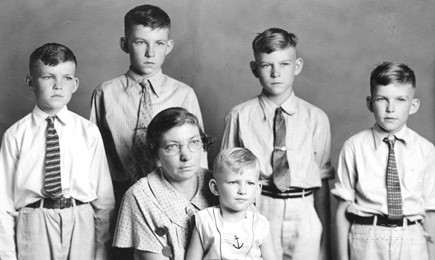 After their father’s death and the loss of his income, the family lost its place to live. Dad’s uncle Morton Reed traded some farmland near Wheatland for a small house in Loveland, Colorado and moved the family there. They qualified for widow and orphan benefits in Colorado because the accident had occurred there. Shortly after their arrival, they had a family portrait made with Harold, Owen, Robert, and Earl (my dad) in the back row and their mom, Grace, and Donald in the front.
After their father’s death and the loss of his income, the family lost its place to live. Dad’s uncle Morton Reed traded some farmland near Wheatland for a small house in Loveland, Colorado and moved the family there. They qualified for widow and orphan benefits in Colorado because the accident had occurred there. Shortly after their arrival, they had a family portrait made with Harold, Owen, Robert, and Earl (my dad) in the back row and their mom, Grace, and Donald in the front.
- Dad and his brothers used to say, “We hated Colorado when we had to move there in 1936, and we still hate it.” Still, Harold remained there for the rest of his life, and Robert returned to Colorado after his military service. Hazel also returned to Colorado when her daughter was grown. My dad relocated to Colorado several years ago to live closer to me.
- Dad and his brothers suffered some frightening injuries when they were young. They sneaked into a broom-making factory one day where they initially had fun poking stalks into the cutting machine. Then Dad pushed one too far and cut off the end of his middle finger. His older brother Owen scooped up the detached digit with his handkerchief, handed it to my dad, and told him to take it home to their mother. She immediately took Dad to the country doctor who sewed it back on. Dad carries a bad scar from this accident, but the finger regained full functionality.
- Harold suffered a more severe injury while tree climbing. He accidentally grabbed an electrical wire and suffered a severe shock. For a long time afterwards, he had difficulty opening his hands. The same country doctor who had treated Dad instructed Harold to exercise by squeezing a small rubber ball. Harold eventually recovered full use of his hands.
- Dad loved sports. At school he went out for football, basketball and track. He played wide receiver on the high school football team and went on to play college football at the school in Greeley, CO. He lost several teeth when he once went head-first into a goal post. Dad’s brother Robert was the high school basketball coach, and my tall father was the center on the team. During his high school years, Dad went to the stadium one spring day to watch track practice. The coach needed someone to pace the boy who ran the mile for the track team, and he called my dad out of the stands. He beat the other boy in their race, and from then on, my dad was the miler for Loveland High School. He set a school record.
- The Loveland economy relied on sugar beet farming. With no men around during WWII, local high school students filled in during the harvest. In 1943, the school closed for two weeks, and Dad helped to bring in the crop.
- During those years, Dad had a little white dog. Runt had belonged to neighbors who could not take him along when they moved. The Reeds took him in.
- Dad enjoyed reading from the time he was young. In Loveland, he began his lifelong patronage of the public library. He read mostly non-fiction like military history.
- Dad graduated from high school when he was seventeen years old. He promptly enlisted in the Navy and went to San Diego for boot camp in 1945. After transport through Pearl Harbor to Okinawa, he was assigned to the USS Seer, a mine sweeper in the South China Sea. He spent Christmas, 1945 in Shanghai, China. Upon demobilization, he hitchhiked back to Colorado. With him he brought some Chinese pottery, a kimono, a Japanese military rifle, and his pea coat embroidered with a Chinese dragon. He also had a few photos of his time in the service. Although he served in the Navy, he did not acquire any tattoos when so many of his shipmates did. “I wasn’t interested,” was all he would say about that.
Dad has now outlived all his siblings. He will be 90 years old this week. He no longer remembers much of his younger days. I wish he had told more stories about his youth. Living through the Depression and the early death of his father made life hard for a young boy. I can see why he did not speak about it much.
52 Stories #22-Spending Time With My Dad
 My Dad worked as a petroleum landman and traveled a lot. He often spent weekdays on the road in another state, and one time he had a 3-month temporary assignment half way across the country. Nevertheless, on his weekends or rare weeks at home, he took time for me. What did we do?
My Dad worked as a petroleum landman and traveled a lot. He often spent weekdays on the road in another state, and one time he had a 3-month temporary assignment half way across the country. Nevertheless, on his weekends or rare weeks at home, he took time for me. What did we do?
- He read to us. Dad liked to read, and he served as the parent who read bedtime stories to my brother and me. As we grew older, he took us to the library every weekend. During those visits, he made sure we had plenty of time to browse for just-the-right books.
- He drove us to church on Sundays. My mom did not like to go, and she could not drive, so Dad took us every week. He would serve as an usher during the church service, go home briefly while we attended Sunday School class, and then return to pick us up.
- Dad took care of our lawn, and I helped him with the weeding. We spent many summer evenings working in the yard, chatting away about anything and everything as we pulled undesirable plants from the grass and flower beds.
- I learned cleaning skills from my dad. As a Navy veteran, he took pride in keeping things Ship Shape, and he took responsibility for the basement and the garage. He enlisted my brother and me to help. These chores did not seem so bad when Dad turned them into a group activity.
- When my brother and I were tweens, Dad introduced us to local history. On summer weekends, he took us to various sites around Wyoming where we could experience the history of our state.
- As I grew a little older, Dad and I discovered a mutual interest in family history. We began to compile information, contacting relatives to learn more. He and I worked together on the family tree for many years until he could no longer do so.
- My dad enjoys music. He regularly listened to the radio in the car. He bought a record player when I was small, and he built a small collection of albums for it. Now that he lives in an assisted living complex, I like to visit him during a music activity. He and I sing together or watch a performing group.
Like all kids, I have always thought my dad is the best dad in the world. I realize now that it must not have come easily for him. His own father died in an accident when Dad was seven years old. Never again did Dad have a father in his household. He had no man at home to teach him and guide him. He had no role model for becoming a father himself. Despite that, he did a great job with us.
52 Stories in 52 Weeks #21—Dad and Me
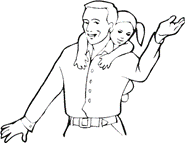 As the firstborn in my family, I am Daddy’s Girl. Over the years I have worked hard to earn his approval, and he generously supports me in whatever I do. He is so approachable that I never hesitate to ask for his help or confide in him. He has an endearing gentleness that I recognized at an early age. Whenever I stubbed a toe or skinned a knee, I wanted him to treat it.
As the firstborn in my family, I am Daddy’s Girl. Over the years I have worked hard to earn his approval, and he generously supports me in whatever I do. He is so approachable that I never hesitate to ask for his help or confide in him. He has an endearing gentleness that I recognized at an early age. Whenever I stubbed a toe or skinned a knee, I wanted him to treat it.
He and I are alike in some of our physical traits and temperament. I inherited my long legs from him. He put his to good use in sports, but I am not that coordinated. My height simply enables me to reach things in high places.
I also inherited The Temper from him and his paternal grandmother before him. Neither of us has much patience, nor did she. One time she cut down all the trees in her yard out of exasperation with the noisy birds living there. Now that is a short temper, and Dad and I both have it, too.
Dad and I have many interests in common, and we get along well. Over the years we have had long conversations about genealogy, history, finance, and politics. Dad worked as a petroleum landman for a major oil company, and I followed him into that profession. We both liked contracts and land title work.
Dad fostered my life-long interest in reading. He was the parent who read to us when we were young. When I had behavior problems in the second grade, he cured me by introducing me to the public library. He explained that if I just kept a novel in my desk, I could take it out to read instead of disturbing my classmates. It worked.
Dad and I differ in one big way. He has always loved team sports. At school he participated in every season—football in the fall, basketball in the winter, and track in the spring. He set a school record for running the mile, and he played college football. As an adult, he joined bowling and volleyball leagues. I have no such talent, nor do I have much interest in sports. I have rarely joined him to watch a ball game on TV. I prefer outdoor recreation like camping, hiking or bicycling, but Dad did not join me in those activities.
Through the years, my Dad has set a good example for me in all that he did. He nurtured my early interests, took me to church, and taught me valuable life skills. I often wonder how he became such a good dad when he lost his own at the young age of seven. Perhaps he just had a talent for it, and I am the lucky recipient.
52 Stories #20–Strong Women
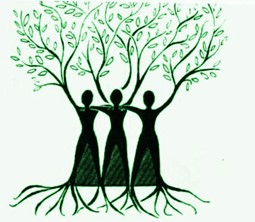 Challenges and hardship can shape people. Have I seen examples of this in my own family? Of course. These women, my ancestors, lived through and overcame obstacles that I cannot imagine facing, yet they survived.
Challenges and hardship can shape people. Have I seen examples of this in my own family? Of course. These women, my ancestors, lived through and overcame obstacles that I cannot imagine facing, yet they survived.
- Olive Dunbar Riddle (1823-1902), my great-great grandmother. She was born on Cape Cod and spent her early years there surrounded by a large extended family. Her Hall and Dunvar forebears had lived in that state for 200 years, so it surely felt like home. Her father worked as a saltmaker. Olive likely envisioned that she would make her life in the area where she grew up, but life had other plans for her. The salt trade dried up before she was 10, and the parents decided to relocate to the country’s interior. They sold everything and moved to Ohio, taking young Olive with them. Shortly thereafter, Olive’s father, Benjamin E. Dunbar, died. Olive lived with her widowed mother until she married John D. Riddle when she was nineteen years old. After their marriage, Olive sold land she had inherited and the couple moved to Mendon, Michigan. There they bought a farm and had a family of nine children. Olive likely worked had as a farm wife, but things did not turn out happily for her. Her husband lost an eye, and they lost a grandchild in a fire. Several of her children moved far away to homesteads in Nebraska. As the years went by, the sight in John’s remaining eye failed, and they relied heavily on the help of their eldest son, Isaac Newton Riddle. By 1896, John greatly feared blindness and poverty. He took his own life, leaving 73-year-old Olive a widow with a farm to run. Olive spent her remaining years on the farm with her son, scratching out a living. She passed away six years later after a hard life of trekking twice through the country to build a new home, raising a large family, and surviving tragedy. Her family remembered her as a kind and sweet woman, so she must have borne it all with grace.
- Anna Petronellia Sherman (1865-1961), my great-grandmother. Petronellia never knew her mother. The family story tells us that this German woman died shortly after the birth of her child. Petronellia spent her early years as a virtual orphan in her paternal grandmother’s Illinois home. Her father Thomas was often away on blacksmithing jobs. When Petronellia was six, a step-mother named Mary came into her life for a few years. Perhaps Petronellia was fond of her step-mother; she adopted Mary’s Methodist faith. Yet by the time Petronellia reached the age of fifteen, Mary was gone, and her father was marrying again. This time, Petronellia definitely did not like her new step-mother, Alice. Petronellia left the stormy household as soon as she was able and promptly married a much older man. Samuel Harvey Reed already had two surviving daughters, 13-year-old Anna and 11-year-old Clara. Eighteen-year-old Petronellia became a step-mother herself. She and Samuel moved to southern Missouri to begin a new life away from Samuel’s disapproving family, and she had seven children of her own. By all accounts, it was not easy to get along with Petronellia. She and Samuel divorced in 1904, and Petronellia later said she had married him because she liked his big, white house in Ashmore, Illinois. She had not known it actually belonged to his father, Caleb. After her divorce she married a former Confederate officer, John Coffey. That did not last long. After their divorce, Petronellia resumed used of the Reed surname and kept it the rest of her life. By World War I, one of her sons, Robert Morton Reed, worked on the railroad in southeastern Wyoming, so she took up a homestead there as a way to make a living on her own. She was in her fifties, and the first year she managed to grow only a bucket of potatoes. She disliked the dry, windblown prairie, so she sold out when she proved up the homestead. Her crustiness had seen her through. She returned to the gentle landscape of southern Missouri. Finding strength in her Methodist religion, she remained there and lived to be ninety-five years old. She is buried in the churchyard of her beloved Methodist church in Huggins, Missouri.
- Laura Riddle (1853-1933), my great-grandmother. Laura could write her name but not much else. She was not much of a student. Born on a Michigan farm to Olive and John Riddle, she became a farmer herself. By 1880, she was a single mother of three sons, two of them disabled. Without much opportunity in Michigan, she moved to Nebraska near McCook to homestead alongside her older sister, Theodocia. A few years later, Laura’s eldest son left home, and Theodocia’s family moved on to Hyannis, Nebraska. Laura herself elected to settle on a new homestead near Palisade with her two younger sons, Louis and Joe. Eventually, she had another child, a daughter this time (my grandmother, Grace). Life on the homestead was hard, and Laura finally had to send Grace to live with Theodocia. When the chance for a larger homestead arose a few years later, Laura and the boys took it and moved on to Haigler, Nebraska. Throughout forty-five years of homesteading, Laura managed to care for her two sons and keep a farm. When she was in her 70’s, she finally gave up her homestead and retired to Palisade with the boys. Described as a strong and robust woman, she lived to be eighty years old. The money from the homestead sale provided her a living for the rest of her life with a little left over for her four children. Despite a life of terrible hardship, Laura had never given up.
- Sofie Sivertsdatter (1878-1966), my great-grandmother. Sofie was born at Valfjord in the county of Nordland, Norway. It must have been a sad household. At least five older siblings had died. Living in a home with elderly parents taught Sofie to be a hard worker. From an early age she contributed by caring for livestock for a relative. Eventually, she made her way to the town of Stokmarknes to work. There she met and married Ole Jorgen Bentsen. Life with him was not any easier. Almost immediately, he left for America, leaving her behind until their first child was born. The next year, traveling alone with a newborn, she made her way across the ocean to meet Ole in Minnesota. They scrimped and saved for two years until they had enough to settle on free land in Montana. Twice they homesteaded there, first on a 160-acre tract and then later on a 320-acre tract. After two more children had joined the young family, Sofie spent one winter virtually alone on the homestead while her husband lay in town ill with typhoid fever. Sofie nearly ran out of supplies and would have starved to death had not a passerby butchered a calf for her. Happily, Ole recovered and returned to her. Eventually, Sofie had another two children while she and Ole continued to manage their homestead and acquire more land. They were proud that they never borrowed against it, not even during the Great Depression. In 1952, they decided to retire to the town of Plentywood, Montana, and they sold their land to their son, Otto. Sofie developed a degenerative illness, but she carried on keeping house for Ole and attending events at the local Lutheran church. Despite her illness, she made fattigmand every year at Christmas time. By 1966, she became too weak to continue, and she passed away at the age of eighty-seven. She is buried in a prairie cemetery at Redstone, Montana, not far from her farm.
Strong women, all of them. I cannot imagine surviving some of the difficulties these ancestors faced. They survived pioneering, brutal farm labor, family tragedy, disabled children, and debilitating illness. If not for them, I would not be here. From their legacy I learned that complaining does no good. Find a way to keep going.
52 Stories in 52 Weeks no. 19—Remembering Grandma
I remember both of my grandmothers so well—the Homesteader and the Flapper. They could not have been less alike, but I thought they both were great. Neither lived in the same town as me, so I looked forward to their visits. They usually stayed at our house at the same time for a couple of weeks in the summer and a couple of weeks at Christmas time.
The Homesteader
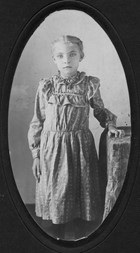 My Dad’s mom, Grace Riddle (1896-1976), was born on her mother’s Nebraska homestead. When she was about four, her mother could no longer care for her, and Grandma Grace went to live with an aunt. This woman had already raised her own family, and Grandma probably provided a good deal of help around the ranch her aunt and cousins ran. When the aunt died, she left Grandma a portion of her estate equal to that of her own children.
My Dad’s mom, Grace Riddle (1896-1976), was born on her mother’s Nebraska homestead. When she was about four, her mother could no longer care for her, and Grandma Grace went to live with an aunt. This woman had already raised her own family, and Grandma probably provided a good deal of help around the ranch her aunt and cousins ran. When the aunt died, she left Grandma a portion of her estate equal to that of her own children.
Grandma Grace seemed quite elderly to me even when I was a small child. Having grown up on a homestead at the turn of the last century, she was very old-fashioned. She wore housedresses and hose supported with ring garters. She never wore makeup. She had no television or telephone at home and did not understand how they worked. Nor could she comprehend why anyone would need them. She had no checking account and paid for everything with cash. Grandma liked to read, and she read every word of the newspaper every day.
Whenever Grandma Grace came to visit, we always eagerly asked whether she needed help unpacking her suitcase. We knew it was filled with trinkets for us. She delighted in collecting small items to give us each time she visited.
She liked to play with me. We made mudpies together, and we shared tea parties. When I was small, we took naps together on hot afternoons. She fell asleep easily while I continually asked whether she was still awake.
Her favorite household chore was washing dishes. That was my job at home, so she liked to help me. We had great conversations as we cleaned up the kitchen. She was interested in everything I did—school, choir, piano lessons.
Grandma Grace had six children, and she knew how to talk to kids. She shared little about herself, instead asking questions to draw us out in confiding in her. I was fortunate to have her for a Grandma.
The Flapper
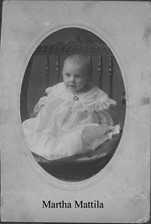 You would never have known that my Mom’s mom, Martha Mattila (1906-1977) was the child of immigrants from Finland. Although she had spoken only Finnish until she started school, she spoke perfect English by the time I knew her. She had gone to college and taught elementary school.
You would never have known that my Mom’s mom, Martha Mattila (1906-1977) was the child of immigrants from Finland. Although she had spoken only Finnish until she started school, she spoke perfect English by the time I knew her. She had gone to college and taught elementary school.
Grandma Martha was a city girl from Minnesota. She had come of age in the roaring 1920’s. Grandma Martha loved shopping, dressing up, getting her hair done, and makeup. As a girl, I was fascinated with her morning routine of choosing a stylish outfit and “fixing her face”.
Grandma Martha enjoyed gossip. As soon as she arrived at our house, she would settle in, light a cigarette, and proceed to tell us the news of our extended family. She knew the dirt on everyone and did not hesitate to share it. Memories of these conversations really helped me reconstruct my family tree when I became interested in genealogy.
Grandma Martha encouraged me in things a girl should know. She exhorted me to continue with my piano lessons when I became discouraged. She helped me with embroidery projects. She taught me to play card games. She bought me thoughtful gifts that I remember after all these years—a leather-bound Bible, a bonnet-style hairdryer.
She liked jewelry and wore a lot of costume pieces. When she tired of something, she gave it to me. I still have some of her necklaces and bracelets. I wore one to my youngest son’s wedding in memory of her.
Their Legacy
I remember both of my grandmothers as being very supportive of me. I knew them equally well even though they lived in other states. I loved when they came to visit, and I always begged them to stay longer.
Both expressed the wish to live long enough to attend my wedding. They both made it! One of my favorite wedding photographs is of my groom and me standing with my grandmothers.
Each of them contributed in her own way to the person I am today. From Grandma Grace, I have a love of reading and a frugal nature. From Grandma Martha I learned life skills. From both these women, I hope I learned to be a good grandmother.